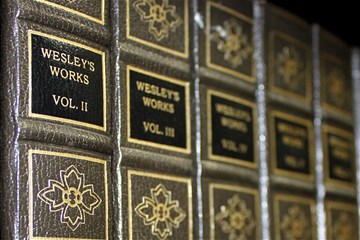Doctrinal Standards of The United Methodist Church
The United Methodist Church identifies four documents as the "doctrinal standards" of the denomination. The Articles of Religion and Confession of Faith (see below) provide the foundational framework for United Methodist doctrine. All United Methodists are expected to teach in accordance with the statements of these two documents.
The other two documents fill out some detail about more specific matters. John Wesley developed his set of "Standard Sermons" (which United Methodists identify as Sermons 1-52 in Thomas Jackson's numbering of Sermons on Several Occasions) as sermons to be preached verbatim by those still learning Christian doctrine and how to preach. His Explanatory Notes upon the New Testament offers brief commentary on the New Testament.
The Articles of Religion
The Articles of Religion were edited and adapted by John Wesley from the Articles of Religion of the Church of England (1563). John and Charles Wesley were priests in the Church of England, and many of the first Methodists were members of it. The Methodist Episcopal Church slightly adapted them in the early years of the denomination (before 1808) for use in the United States of America.
Read the Articles of Religion.
The Confession of Faith
The Confession of Faith from The Evangelical United Brethren Church contains 16 articles. They are similar to the Articles of Religion, on which they are largely based. The Confession of Faith also includes perspectives unique to the heritage of the Evangelical United Brethren. United Methodist interpret the Articles of Religion and the Confession of Faith as complementary and not as contradictory.
Wesley's Sermons and Notes on the New Testament
In his day, John Wesley was a popular preacher. He often published sermons in inexpensive tracts, many of which were quite popular. He also published collections of sermons he titled Sermons on Several Occasions. Much of what we know of Wesley’s theology is contained in these sermons.
His Explanatory Notes Upon the New Testament are a verse by verse tool to help us interpret the Bible. They alert us to Wesley’s deep understanding of Scripture, including his knowledge of the original languages and the thinking of early church writers.
Other Important Documents
The General Rules of the Methodist Church
The General Rules are Methodism's guidance about how to live as faithful disciples of Jesus, fulfilling the vows of baptism. These, with the Articles and Confession, have been protected from any alteration by a General Conference by restrictive rules that require a 2/3 vote of the General Conference plus supermajorities of votes of all annual conferences worldwide. For the Articles and Confession, a 3/4 supermajority is required. For the General Rules, a 2/3 supermajority is required. It is unlikely that such supermajorities will be achieved to enable any further alterations.
The original title of this document was "General Rules for Our United Societies" because they were designed for use in the class meetings of the Methodist Societies John and Charles had organized throughout England, Ireland, and British colonies in North America. They were adopted as continuing guidelines within the Methodist Episcopal Church when it organized in 1784.
There are just three rules, under each Wesley gives a variety of examples. The rules are (1) to do no harm, (2) to do good and (3) to attend upon all the ordinances of God, including worship, searching the scripture, personal and family prayer, fasting, and the sacraments. Practicing these means of grace empowers us to live as United Methodist Christians.
The Bible
The Bible is the primary source for Christian faith and life. In both the Articles and the Confession, United Methodists clarify how they understand the role of the Bible. In the words of the Confession, the Bible "reveals the word of God so far as it is necessary for our salvation." The Articles state, "The Holy Scripture containeth all things necessary to salvation." Both make it clear that United Methodists understand the Bible to be a "salvation book," not a science book, a history book, or a book with guidance for specific forms of civil government. Its value is to teach us about the salvation offered by God's grace through Jesus Christ.
The Historic Creeds
The Articles of Religion of the Church of England included an article asserting that the Apostles, Nicene, and Athanasian Creeds "ought to be thoroughly received and believed." John Wesley omitted this article when he edited them for use by American Methodists. Instead of using them as doctrinal standards, Wesley showed how to use them in worship. He edited the 1662 Book of Common Prayer for use by Methodists. There, he retained the Apostles Creed for morning and evening prayer and at baptism. He omitted the Nicene and Athanasian Creeds entirely. Today, United Methodists continue to use the Apostles Creed at baptism, and for Sunday worship may choose from a variety of affirmations of faith, including the Apostles and Nicene Creeds among others.
Beliefs Shared with Other Christians
Most of what United Methodists believe and teach is shared with other Christians. The Wesleys, Jacob Albright, Phillip William Otterbein, and Martin Boehm did not set out to create new religions or generate new doctrines, but rather to help people live as disciples of Jesus more faithfully. See our section, “Our Christian Beliefs,” for more details about the many beliefs United Methodists share with other Christian denominations.





